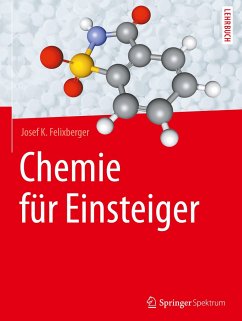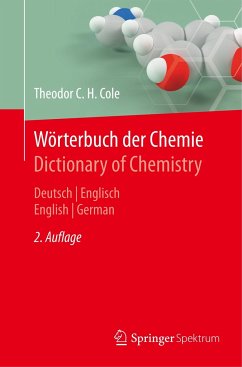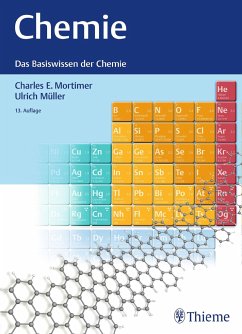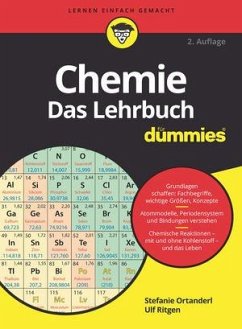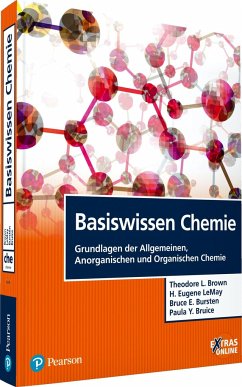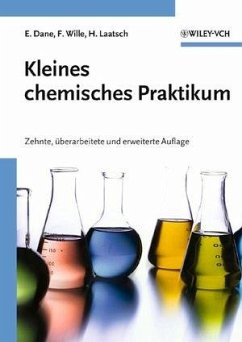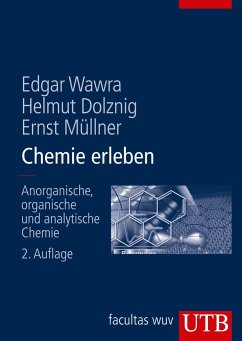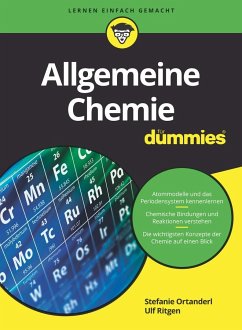![Chemistry^D]3 Chemistry^D]3](https://bilder.buecher.de/produkte/60/60694/60694274z.jpg)
Andrew BurrowsJohn HolmanSimon LancasterTina OvertonAndrew ParsonsGwen PillingGareth Price
Broschiertes Buch
Chemistry^D]3
Introducing inorganic, organic and physical chemistry
Versandkostenfrei!
Sofort lieferbar

PAYBACK Punkte
33 °P sammeln!




Chemistry3 establishes the fundamental principles of all three strands of chemistry; organic, inorganic and physical. Using carefully-worded explanations, annotated diagrams and worked examples, it builds on what students have learned at school to present an approachable introduction to chemistry and its relevance to everyday life.
Andrew Burrows is Professor of Inorganic Chemistry at the University of Bath. He completed his first degree and doctorate at the University of Oxford and worked in Strasbourg and Imperial College London before moving to Bath, where he is currently Head of Department. He has taught many aspects of inorganic chemistry, though his current courses focus on s- and d-block chemistry. His research interests are in porous materials such as metal-organic frameworks and he has published over 160 papers. John Holman is Emeritus Professor in the Chemistry Department at the University of York, Past-President of the Royal Society of Chemistry (2016-2018), and Senior Adviser in Education at the Gatsby Foundation. He was the Founding Director of the National Science Learning Centre from 2004 until September 2010, and adviser to the English government as National Science, Technology, Engineering and Mathematics (STEM) Director from 2006 until September 2010. He has taught learners of chemistry at both school and undergraduate level, has created curricula and written books for science learners up to and including undergraduates, and was the founding director of the Salters Advanced Chemistry programme. In 2014 he was named by the Science Council as one of the 100 leading practising and inspirational UK scientists and in the same year won the Royal Society of Chemistry's Lord Lewis Award and the Royal Society's Kavli Education Award. In 2010 he was knighted by the Queen for services to education. Simon Lancaster has taught Chemistry at the University of East Anglia since his appointment as a lecturer in 2000. He won a National Teaching Fellowship and an RSC Higher Education Teaching Award in 2013 for 'blurring the boundaries between the internet and the lecture theatre'. Simon was promoted to a chair in Chemistry Education in 2014. He was selected as one of RSC's 175 face of diversity in 2016 and championed inclusion and diversity as President of the Education Division Council from 2017-2020. He is a passionate advocate for active learning, in demand as a keynote speaker well beyond the chemistry arena. He has led UEA's chemistry provision as Director of Learning and Teaching since 2015 and has accelerated their implementation of blended learning in response to the Covid-19 pandemic. Tina Overton has been Professor of Chemistry Education at the University of Hull and Monash University and was Director of the University of Leeds Institute for Teaching Excellence. She has published widely in chemistry education and science education research and is the author of several textbooks. Tina has been awarded the Royal Society of Chemistry's Higher Education Teaching Award, Tertiary Education Award, and Nyholm Prize, and the Royal Australian Chemistry Institute's Fensham Medal. She is a National Teaching Fellow and Senior Fellow of the Higher Education Academy. Andy Parsons is a Professor of Organic Chemistry at the University of York. His teaching has been recognised by a Royal Society of Chemistry Higher Education Teaching Award. He is a Senior Fellow of the Higher Education Academy (HEA) and, in 2018, was awarded a prestigious National Teaching Fellowship by the HEA in recognition of his inspirational and innovative approaches to teaching. In 2017, he delivered a first ever University of York MOOC, called Exploring Everyday Chemistry, which has attracted over 20,000 learners from more than 140 countries. Gwen Pilling is a former Fellow in the Department of Chemistry and member of the Science Education Group at the University of York, with experience of teaching chemistry at both secondary school and undergraduate level. She was Director of the Salters Advanced Chemistry Project and Chief Examiner for the OCR Chemistry AS and A Level Examinations from 1992 to 2002. Her main areas of interests were curriculum development in chemistry in the post-16 school age group, supporting teachers through curriculum change, the interface between secondary and tertiary education, and context-led courses in higher education. Gareth Price graduated from the University of Bath with 1st class Honours and a PhD in Physical Chemistry. After postdoctoral research in Toronto, Canada, he was appointed to a lectureship in chemistry at City University, London in 1986 and moved to the University of Bath in 1988 were he was promoted to Professor in 2009. In 2019 he joined Khalifa University in Abu Dhabi as Professor and Chair of Chemistry. As well as Chemical Education, Gareth has research interests in the synthesis, characterisation and application of new polymers and nanoparticles. Outside the University he has been involved in the accreditation of degree programmes with the Royal Society of Chemistry where he was also elected President of the Education Division.
Produktdetails
- Verlag: Oxford University Press
- 4. Auflage
- Erscheinungstermin: 13. September 2021
- Englisch
- Abmessung: 277mm x 220mm x 54mm
- Gewicht: 2825g
- ISBN-13: 9780198829980
- ISBN-10: 0198829981
- Artikelnr.: 60694274
Herstellerkennzeichnung
Libri GmbH
Europaallee 1
36244 Bad Hersfeld
gpsr@libri.de
Für dieses Produkt wurde noch keine Bewertung abgegeben. Wir würden uns sehr freuen, wenn du die erste Bewertung schreibst!
Eine Bewertung schreiben
Eine Bewertung schreiben
Andere Kunden interessierten sich für


